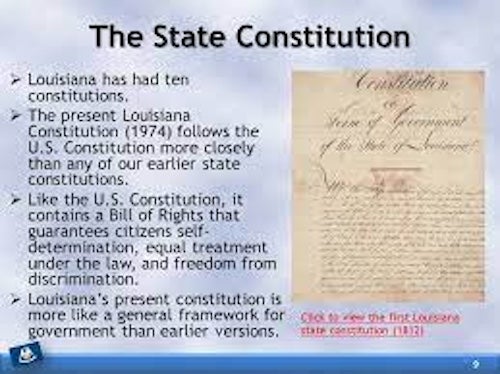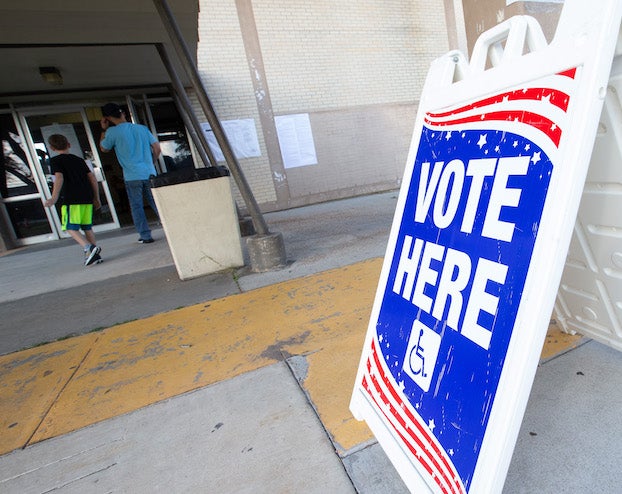Jim Beam column:New constitution no slam dunk
Published 6:40 am Saturday, March 23, 2024

- Louisiana has a relatively new 1974 state constitution but Republican Gov. Jeff Landry wants the Legislature to write a new one this summer. Landry will find it's easier said than done.(Image courtesy of slideplayer.com).
While doing some research on Louisiana’s 1974 constitution, I ran across a headline that caught my attention. The headline on an April 24, 1974, American Press editorial said, “Republican future bleak.”
The GOP at that time held only four seats in the Louisiana House and one seat in the Senate. The editorial said Republicans also held “roughly a dozen parish and municipal posts about the state.”
The current Louisiana House has 73 Republicans and 32 Democrats. The Senate has 28 Republicans and 11 Democrats.
The late-President Richard Nixon’s unpopularity because of the Watergate scandal, rising unemployment, and inflation were the reasons the newspaper said the Republican future was bleak.
The midterm elections on Nov. 5, 1974, proved the editorial was on the mark. The Associated Press said voters gave Democrats a tighter grip on Congress and many national governorships after the elections.
My, how times have changed! However, let’s get back to the 1974 state constitution.
Republican Gov. Jeff Landry doesn’t like the constitution and wants to write a new one. The supermajority GOP Legislature has already indicated it’s ready to give Landry almost anything he wants. He has had some losses but not enough to make him think his luck has changed.
Jeremy Alford and David Jacobs in their LaPolitics Weekly said chatter about Landry’s anticipated constitutional convention planned for the summer “is already sucking oxygen out of the Capitol’s hallways, even with a regular session in full swing.”
Delegates were elected for the 1973 constitutional convention, but Landry wants legislators to be delegates, along with 27 of his personal appointments. In addition to those whom he appoints, Landry would have 101 Republican delegates in his corner.
Rep. Larry Bagwell, R-Stonewall, and an educator, wanted to be a delegate in 1973 but lost the election. He told LaPolitics Weekly he isn’t sure Louisiana needs another convention and “worries about losing protections for state K-12 education funding.”
It’s funny Bagley would mention that since Lane Grigsby, who headed one of Landry’s transition teams, said being able to reduce K-12 funding is one of his goals for the convention. Many conservatives prefer school choice over public education.
The centerpiece of Landry’s education agenda is the creation of education scholarship accounts (ESAs) that would give families public money to help them pay for private schools and other education expenses outside the public school system.
After Arizona made all families eligible for ESAs in 2022, The Advocate said the cost of the program more than tripled to $587.5 million.
Appointments are OK for writing a new constitution, but most delegates to any constitutional convention should always be elected. Legislators could run for a seat if they are interested.
Alford and Jacobs said those who are affected by a new constitution are nervous. “Who can blame them?” they asked. “When it comes to policy making, nothing is more important than the fundamental law found in a constitution.”
The AP in 1974 said opponents of that proposed constitution, including several large newspapers, maintained that the document’s brevity — which they applauded — wasn’t enough to override what they viewed as its fatal flaws.
The main controversy was over the taxation article of the proposed constitution. It set a 10% assessment level for homes and a 15% level for business property.
“Coupled with a $3,000 homestead exemption, this means no tax would be collected on any home in the state valued at $30,000 or less,” the news agency said. Opponents were concerned that change would shift the tax burden to industry and result in a slowdown in business growth.
The 1974 constitution was approved but only 37% of the state’s 1.7 million voters went to the polls. The final vote showed 358,588 favored the new document, and 262,030 were against, a winning margin of 96,558 votes.
Only 27 of the state’s 64 parishes voted for it. It lost in all six parishes in this corner of the state. Four of the six metropolitan areas also were opposed. The New Orleans and Lafayette metro areas voted for it.
Getting a new 2024 constitution approved that Landry could pretty much write himself would be a tough sell for voters who will have the final word.
|
ReplyForward
|





